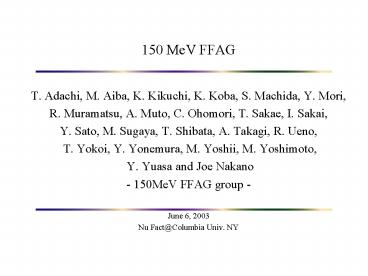150 MeV FFAG - PowerPoint PPT Presentation
Title:
150 MeV FFAG
Description:
150 MeV FFAG – PowerPoint PPT presentation
Number of Views:44
Avg rating:3.0/5.0
Title: 150 MeV FFAG
1
150 MeV FFAG
- T. Adachi, M. Aiba, K. Kikuchi, K. Koba, S.
Machida, Y. Mori, - R. Muramatsu, A. Muto, C. Ohomori, T. Sakae, I.
Sakai, - Y. Sato, M. Sugaya, T. Shibata, A. Takagi, R.
Ueno, - T. Yokoi, Y. Yonemura, M. Yoshii, M. Yoshimoto,
- Y. Yuasa and Joe Nakano
- - 150MeV FFAG group -
- June 6, 2003
- Nu Fact_at_Columbia Univ. NY
2
Contents
- Present status of 150MeV FFAG Accelerator
- Introduction of FFAG
- Schematic drawing of 150 MeV FFAG
- Parameter
- Magnet, RF, etc
3
Introduction - Characteristics of FFAG
- Fixed Field flexibility, easy operation,
large beam current, low power consumption - FFAG magnetic Field BB0(r0/r)k
- Satisfying the cardinal condition,
zerochromaticity Scaling FFAG - High repetition rate
- Super conducting magnet
- Alternating Gradient Accelerator
- strong focusing, down sizing
- Compact size ( cf. Cyclotron)
- Large Horizontal acceptance
- wide aperture
- Large momentum acceptance
- FFAG has characteristics becoming to the large
intensity proton driver and the manipulator of
secondary beam PRISM, Muon Accelerator. - The design of Neutrino factory, Japanese group
proposes, based on scaling FFAG ring.
4
Introduction-150 MeV FFAG project
- FFAG was proposed by Ohkawa, Symon and
Kolomensky. (50s) - An electron FFAG at MURA project in the 50s
- PoP FFAG the first proton FFAG in the world
- In June 2000, Our PoP FFAG accelerated the proton
beam successfully. - confirming the acceleration can be done in
1msec. - 150 MeV FFAG project the second proton FFAG
- The project to construct a practical machine was
started. - feasibility study for scaled-up FFAG Accelerator
- ex.) Construction of large FFAG ring
- Fabrication of Yoke-Free Magnet and large
aperture RF system - Demonstrating the beam acceleration and
extraction in high reputation rate - Establishment of injection and (FAST) extraction
scheme
5
150MeV FFAG Schematic view
KEK-PS East Counter Hall
6
FFAG Schematicview
Beam Dump
P.S. FFAG magnet
RF
Straight Chamber
Beam profile monitor
Ext. B-Septum
Cyclotron
Bump magnet
Beam transport
FFAG Magnet
B-Septum
P.S. for Ext. B-Septum
FFAG Control Room
Current Monitor (CT)
E-Septum
Kicker magnet
Kicker power supply
7
Cyclotron
Mag. Septum
Bump
Beam transport
Mag. Septum
Bump
E-Septum
Kicker magnet
150 MeV FFAG ??????
8
150MeV FFAG Parameter
Cyclotron Parameters
Energy 12MeV Field 1.69T Current(full)
25µA RF Freq. 50Mhz Dee Voltage pulse
width 160µsec_at_250Hz Extraction Current
0.5µA (Current in Cyclotron 2µA) ( Deflector
loss 1.5µA)
Dee Voltage with Gate pulse
80µsec
160µsec
4msec
9
150 MeV FFAG scaling FFAG
- 150 MeV FFAG is a scaling FFAG.
Tune vs. mean radius
BL-F/D ratio vs. radius
excursion
Tune diagram
Design satisfy the zero-chromaticity.
10
150 MeV FFAG - Return Yoke Free Magnet
- Return Yoke Free Magnet The return yoke of
Focusing sector is removed.
Deviation between Measurement and TOSCA design
is within 0.3 in flat field area.
FF B in F Sector FD B in D Sector FS B in Shunt
11
Alignment of the maget
We aligned the magnets within the precision of
0.2 mm.
12
Cyclotron(Injector) and Beam transport
- Cyclotron
- 10 MeV proton beam
- 250Hz pulse operation
- Max. extraction current 0.5µA
- Transport
- 2 sets of steeringtriplet Q mag.
13
Beam Injection Study
- 10MeV(137MeV/c) proton Injection Study with
Magnetic and Electric Septum
Magnetic field 1T for 10MeV proton ?450mm
E35kV/cm Deflecting angle 80mrad Distance
between electrode 22mm
14
Beam Injection Study
With Magnetic and Electric Septum
we are studying the beam orbit in detail, and
installing the bump magnets for the beam
acceleration
150 MeV FFAG ??????
15
RF system
- Large Magnetic Alloy (FINEMET) Cavity
- Number of core 4 pieces
- Outer (Inner) size 1700x950mm(980x230mm)
- Core thickness 25mm
- RF frequency 1.5 4.6 MHz
- RF voltage 9kV
- RF output 55kW
- Power density 1W/cm3
- Cooling water 70 L/min
16
Summary
- We finish the construction of 150 MeV FFAG ring,
and starting the beam study. - We observed the circulating beam of one turn with
Faraday Cup with Magnetic and Electric Septum on. - the next ..
- We are now studying the injection beam orbit in
detail, to confirm the FFAG ring satisfying our
design. - After installing a set of bump magnets, beam
acceleration will be started.
17
150 MeV FFAG The design of the magnet pole
- The design of the edge of
- the F-sector pole
- The final design of the poles
w/o patch
with patch
Magnetic field in the center of sectors
BL
BL-F/D ratio vs. radius
A comparison of Magnetic field in the focusing
sector
18
FFAG Magnet alignment
????????? ??10????????????? ???????
2m 10?0.000048 ? 0.1mm???????
?????????
COD?????0.5mm??????????0.2mm??????????????
19
Measurement of Magnetic field
Alignment error 0.2mm
All area of half cell, where the beam pass
through, is covered by moving the measurement
bench.
20
Calibration of FFAG magnet
Measured field with various F D current
Coil F 50 turn D 5 turn
Design (125MeV mode) F 910A / D 780A
Trimmed F 883.7A / D 1042.3
Measured field magnitude (not shape) deviates a
little from design value.
21
150 MeV FFAG - Measurements of magnetic field.
Measurements of magnetic field with hole probe.
Discrepancy (?B/B)
Y
The discrepancy between any two magnets is 0.3
at most. The alignment error of hole probe
explained that discrepancy.
Y-3545cm 5cm step
X
22
Simple Comparison to TOSCA(after current
trimming)
dB/B (measured-TOSCA)/TOSCA
Deviation between Measurement and TOSCA is
within 0.3 in flat field area.
23
Discrepancy between any Magnets
24
150MeV FFAG Schedule































